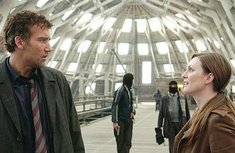Cinema: Children of Men

Conspiracy theories are characterised by their detractors as a consolation; they explain a world that in reality is resistant to neat explanation. Similarly you could say that dystopias, although depicting shattered worlds, are a symptom of the persistenc of hope, in this instance that something will happen at some stage in the future. In other words, life always won't be this boring,a change is gonna come.
But inevitably dystopias (and utopias) are also a working out of the consequences of the particular political, economic moment the writer finds him or herself in.
A fine example of this genre,'Children of Men', was released today in Dublin. It is adapted from a novel by PD James and directed by Alfonso Cuaron, who previously lensed Amores Perros and 21 Grammes. Ok, and 'Arry bleeding Potter.
The film is set in 2027 in a world where all the women have been infertile for the last eighteen years and a fascist junta holds an iron grip on power in England, the only country that continues to have a functioning state apparatus. To continue its existence, the state has revived the idea of Britishness, which in turn gives them the excuse to wage a savage campaign against the many immigrants who come to the country in search of work. For those despairing in the face of inevitable extinction, the goverment helpfully provides a suicide kit called 'Quietus'.
Clive Owen, who I normally find irritating, delivers a good performance as a deadbeat bureaucrat, sloping around in a fug of alcohol and cigarettes. His only friend is the hippiesh Michael Caine, who lives in a secluded pastoral setting, far from the bleak future London, with its rickshaws and billboards encouraging people to inform on their neighbours if they suspect them of being illegal immigrants (which turns out to be topical in the week that British Home Secretary John Reid suggested that Muslim parents should keep an eye on their children for fear they may fall under the sway of extremists.)
Owen is contacted by a former lover, played by Julianne Moore, now involved in a resistance movement fighting on behalf of immigrants. It turns out that Owen once was a radical too but his life was destroyed when he and Moore's child died some twenty years previously. He to the bottle, she to the cause.
In any event, Moore tells Owen they have discovered a young pregnant woman and need his help to get her out of England. Initially cynical and solely interested in the money on offer, Owen is converted when he sees the pregnant woman and realises that both the resistance faction and the state are likely to exploit her and her child ruthlessly.
Despite some uncomfortable religious undertones, it is a compelling film full of references to current political events. Immigrants are housed in cages at train stations and on arrival at detention centres they are hooded and forced to crouch in a manner similar to the detainees at Guantanamo Bay. In fact, the detention centres are more accurately described as war-torn ghettoes, raising parallels to what happened in Lebanon in August and what is still going on in Gaza.
The film also expresses current fears in European countries about the dwindling birth rate, which has fallen below replacement levels in Spain, Italy and Germany. People are having fewer children later in life, the slack is being taken up by immigrants, which in turn is leading to an extremely disturbing revival in far right politics as witnessed in Mecklenburg last week.
Added to the topicality, is the direction, which Cuaron executes masterfully. The action is well paced, with explosions and gunfire visceral in the extreme, and though the film holds out hope of redemption - there are some problematic scenes - it ends ambiguously, the viewer left uncertain as to whether the first new child in twenty years will survive the next twenty minutes.
Labels: Children of Men, Cinema, Cuaron


0 Comments:
Post a Comment
<< Home